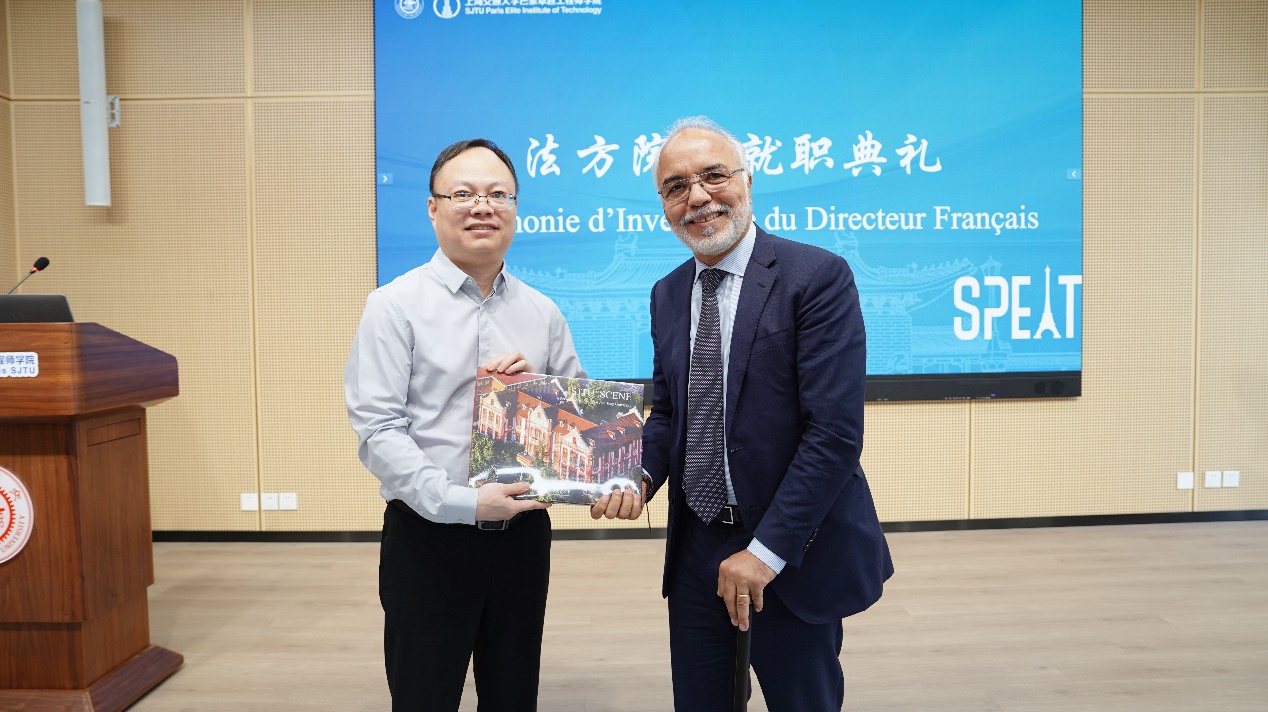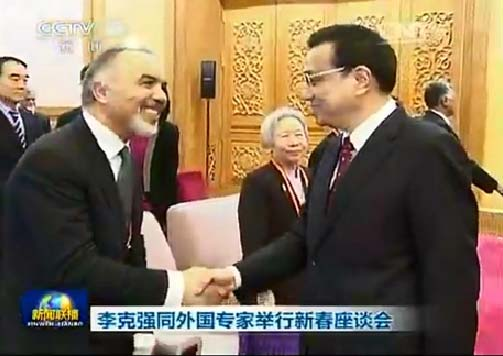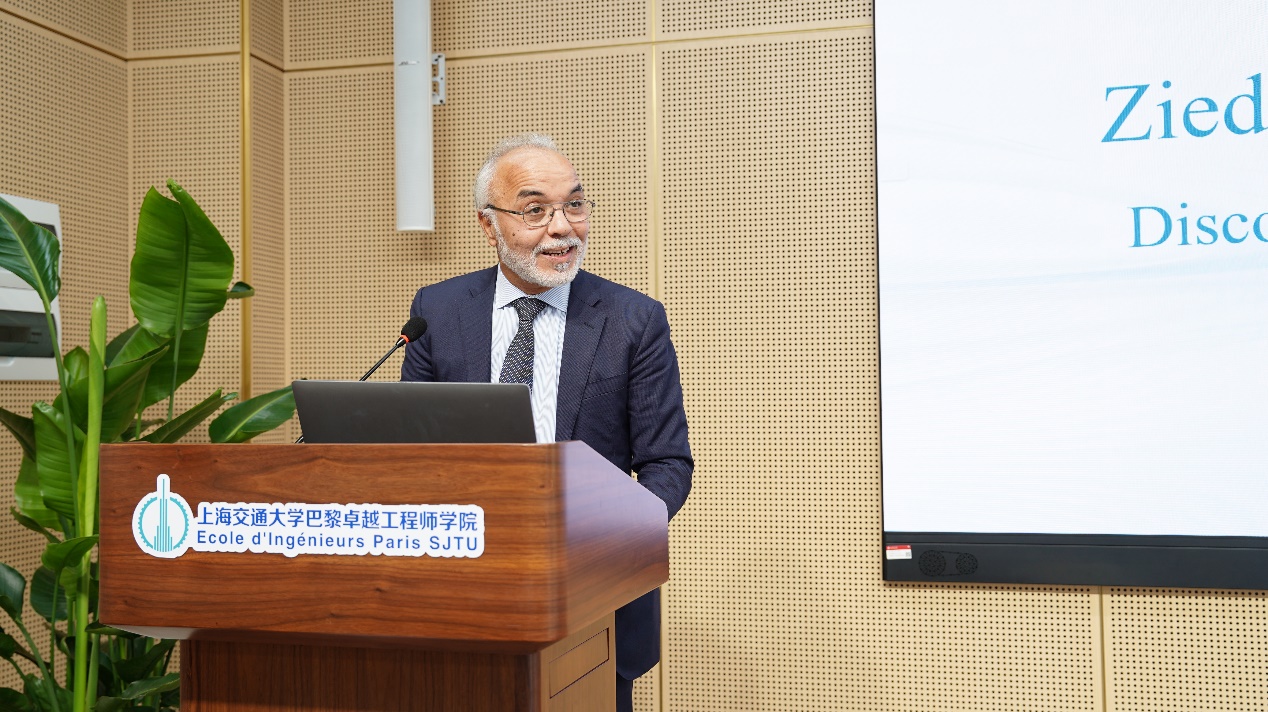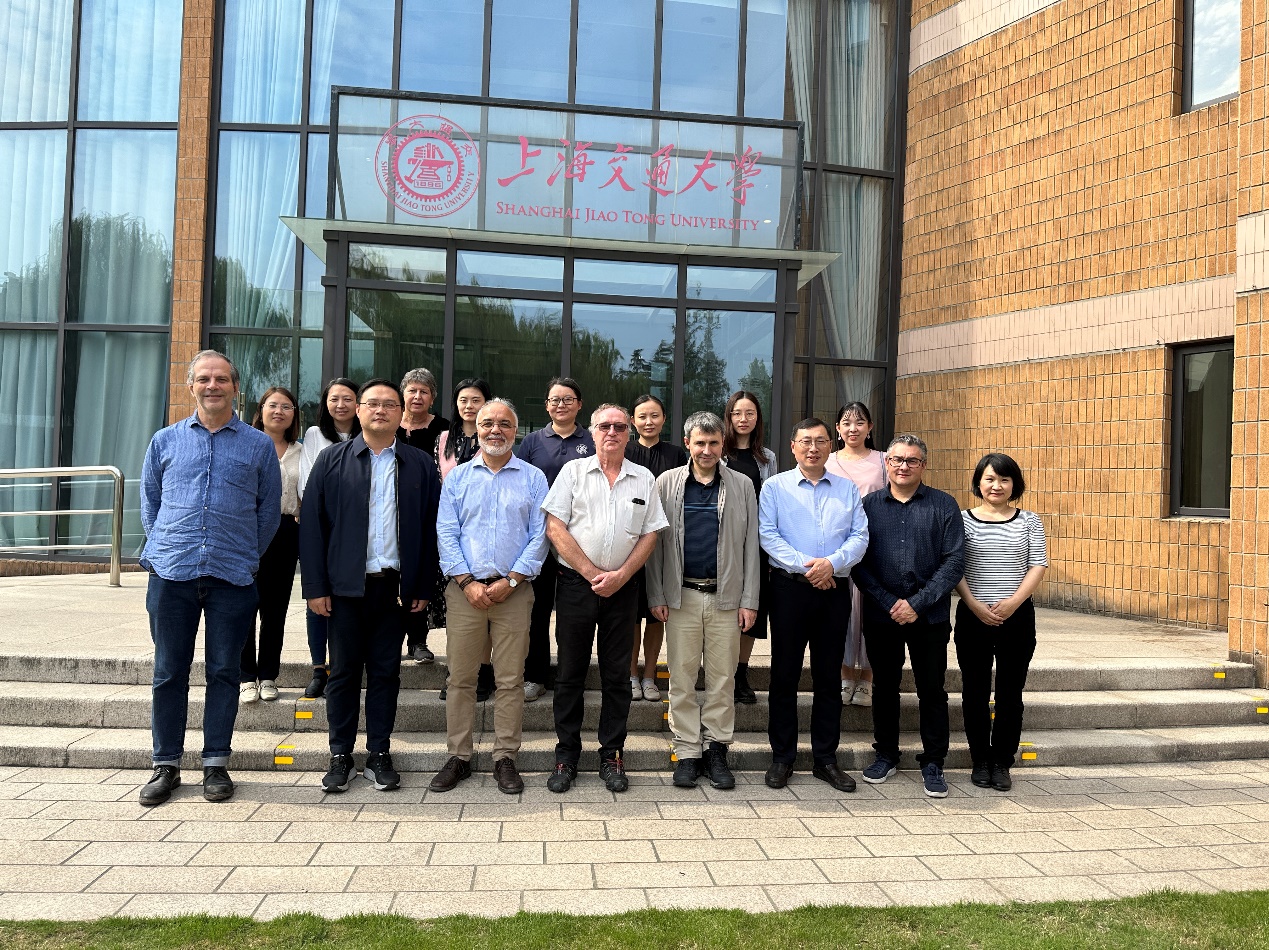Editor’s Note: Recently, Professor Zied MOUMNI has been appointed as the French Dean of the SJTU Paris Elite Institute of Technology (SPEIT). Dean Zied is a longtime friend of both the Institute and the Chinese people. In his inauguration speech, he expressed his deep emotions, stating, "Twelve years ago, I had the honor of witnessing the establishment of SPEIT, and as a member of the mechanical engineering teaching team, I formed an inseparable bond with the Institute. This experience not only reflects my profound affection for the Institute but also embodies my boundless love for this land of China."
Professor Zied is not only renowned in academia but also received the Chinese Government Friendship Award in 2015. In this year, which holds special significance as the 60th anniversary of Sino-French diplomatic relations, we conducted an exclusive interview with Professor Zied. How did he connect with China? What are his views on China-France educational cooperation? What are his plans and expectations for the future of SPEIT? This interview will provide us with deeper insights.

Part 1: Connection with China
01 We learned that you were awarded the Chinese Government Friendship Award in 2015, which is considered the highest award given to foreigners by the Chinese government. Can you talk about the circumstances at that time? Did you anticipate this?
Yes, I indeed had the honor of receiving this prestigious award in 2015, following my collaboration with Northwestern Polytechnical University in Xi’an from 2012 to 2015. My work was successful, and I formed an international research group (including China, France, the United Arab Emirates, and Turkey) that is now globally recognized for smart materials and structures. This was a memorable experience for me; I was received by Prime Minister Li Keqiang, who unfortunately passed away last year. He was a great figure who, I believe, had a significant impact not only on China but also on the world. I extend my sincere condolences to the Chinese people for the passing of Premier Li Keqiang.
Therefore, this award was a great surprise and a tremendous honor for me. To be honest, when I learned that I had been selected for this award, I simultaneously learned of its existence; I was not familiar with it before. I then went online to find out more and learned that many prominent individuals had received this award. I realized it was a very important event. As I mentioned, the significance of this event was confirmed during the award ceremony, which took place at the Great Hall of the People in Beijing, with nearly all government members present. We were received by the Prime Minister, and later in the evening, we were offered a dinner attended by the President himself. At that moment, I grasped the importance of this award and the immense honor it bestowed upon me. It is a recognition that marks a lifetime. I feel a great pride in having, in my own way, contributed to the collaboration between France and China. I came to China as part of a collaboration between my university and Northwestern Polytechnical University in Xi’an, and I believe this award reflects the success of Sino-French cooperation. SPEIT is also an excellent example of this. This award encourages me to continue building more academic and scientific ties between France and China.

02 When was your first visit to China? Was it in 2012?
No, in fact, my first contact with China was very brief. To attend a conference in Australia, I passed through Hong Kong and stayed there for a day. However, I don’t have any memories of that first contact with China. Then, indeed, my first real contact was with the city of Xi’an, and it was a true cultural shock. As you know, Xi’an is a city rich in history, and I really discovered the true Chinese culture there, the Chinese people, the values of China, the importance of family, Chinese society, etc. I can say that those years in Xi’an allowed me to better understand Chinese culture.”
03 Xi’an is a city with a rich cultural heritage. Did your work experience there enhance your understanding of Chinese culture? Or did it make you appreciate certain aspects of Chinese culture?
Absolutely. In fact, my experience during those years allowed me to better understand Chinese society and culture. I had some idea of it, but like everyone, it was based on our readings or the media. But when you experience China firsthand, you actually find something completely different. For example, I really appreciated the values of Chinese society. A typical example is the importance of family in China, as well as the reverence for ancestors and the elderly. The older people I met seem to have a good quality of life because they live with their families who take care of them. I was also surprised to see that elderly professors continue to live on campus. This, in my view, reflects the value placed on them.
I discovered many other aspects of Chinese culture. For instance, Chinese cuisine is incredibly diverse and excellent, and the tea culture is, in my opinion, akin to the wine culture in France. I particularly enjoy tea ceremonies; I find them both interesting and relaxing. I also love everything related to ceramics.
Additionally, I noticed the value placed on friendship in China, which I believe is linked to Confucian values that emphasize the importance of friendship, family, and music, which I think go together.
I’ve tasted different types of tea. One of my favorite pastimes is to go drink tea in traditional tea houses; I can spend a lot of time tasting tea, and it relaxes me a great deal. On weekends, I often did this when I was in Xi’an.
This reminds me of another aspect of Chinese culture that I really like, which is the way meals are shared. Eating around a round table with a rotating platter and dishes that everyone shares encourages interaction and conversation. It’s a true sharing experience; we all eat the same thing, which brings us closer. I find this social approach very interesting.
Part 2: Connection with SPEIT
04 What was the chance that brought you to SPEIT?
In fact, my story with SPEIT almost began with my work in Xi’an. At that time, while I was in Xi’an, the leadership at ENSTA encouraged me to conduct research abroad. France encourages every researcher to work abroad for a while to gain different experiences. At the same time, the SPEIT project was starting up, I remember it was in 2011 or 2012. Therefore, the ENSTA management saw an interesting combination: I had research experience in China, which I could integrate with SPEIT. Thus, when the SPEIT project began to take shape, I was immediately assigned to collaborate with French schools and Chinese colleagues to jointly develop mechanics courses. So, in fact, I started working even before the SPEIT project officially launched. I’m referring specifically to the master's (engineering) stage; I did not participate in the preparatory phase. Since then, I have been collaborating with SPEIT.
05 Your courses have received high praise from SPEIT students. Is your teaching for Chinese students the same as in France, or have you made adjustments?
From the perspective of scientific content, I change almost nothing. However, I make adjustments in how I deliver the course. The reason is that I’ve noticed a difference in the reactions of French and Chinese students. French students tend to ask questions when they don’t understand, while Chinese students do not, which poses a challenge for me as a teacher. The adjustment, if we can call it that, involves me asking questions to Chinese students to check if they are following along and whether they understand. This was a bit destabilizing at first because if no questions are asked, students remain silent, and it’s hard to know if they are grasping the material or not. So, I ask many questions of Chinese students, whereas I don’t do that with students in France. In France, a student who doesn’t understand typically speaks up. This might be the only ‘adjustment’ I make. From the perspective of scientific content, I keep the same material. I believe this behavior is a cultural trait; I’ve understood it, and now it goes well because I know how to engage with Chinese students.
06 Do you have any unique teaching methods or specific educational philosophies?
No, I can’t say that I have a specific teaching style. Personally, I believe that pedagogy comes with experience. I also strongly believe in the connection between research and teaching, especially in higher education. For instance, in an engineering school like SPEIT, knowledge and science evolve through scientific research. Therefore, teaching must be informed by scientific research to keep up with this evolution. This can be achieved by incorporating concrete examples from research, which helps to better understand very theoretical courses.
I’ll take the example of the course on the mechanics of continuous media. It’s a very theoretical course that can seem abstract and dense. Thus, it’s essential to rely on concrete cases from industry or research to explain and contextualize overly theoretical concepts in a simple way. If I had to talk about "philosophy," it would primarily involve trying to explain complicated things using simple concepts. I firmly believe that if you understand something well, you can explain it simply. It’s also important to enrich our courses with examples and to create strong links between research and teaching; teaching also impacts research.
I’ve also been fortunate to have taught nearly all the mechanics courses in the Mechanical Engineering curriculum at ENSTA, which is very similar to that of SPEIT. In the first year, we have the foundational courses in the mechanics of continuous media; in the second year, we cover nonlinear mechanics, which is a bit more specialized, along with couplings; in the third year, we focus on numerical methods. This experience has given me a comprehensive perspective on the entire mechanical engineering curriculum. Consequently, I know the prerequisites necessary for each course and how to prepare a third-year course from the second year, for example. Continuous and comprehensive teaching experience allows for mastery of the entire program and facilitates teaching.
For me, a higher education teacher must also be a researcher. Conversely, a researcher must teach to share their knowledge and thus advance science.

07 We noticed that you obtained a PhD in Mechanics in 1995 from X and a PhD in Engineering Sciences in 2009 from Paris VI. Could you tell us about these two educational experiences? How did they impact on your subsequent research?
First, there is the PhD prepared at the Solid Mechanics Laboratory at Polytechnique. However, at Paris VI, it is a qualification to supervise research, called by HDR, which is a level above the PhD. It's equivalent to what was previously called a state doctorate. There was an initial doctorate, the third cycle doctorate, and then the state doctorate, which was the highest degree in the academic field in France.
My PhD and HDR have had a significant impact on my professional life and my research career. I was fortunate to prepare my thesis at the prestigious Solid Mechanics Laboratory of the École Polytechnique. I worked there with three eminent researchers: Professor Q. S. Nguyen, my official thesis supervisor, as well as Professor H.D. Bui and Professor K. Dang Van, from whom I learned a great deal about theoretical modeling. With Professor Q. S. Nguyen, I learned how to use mathematics to model mechanics. With Professor H.D. Bui, I worked on complex fracture mechanics problems and learned to solve them, particularly analytical problems. Professor H.D. Bui was adept at making necessary assumptions and simplifications. Finally, with Professor K. Dang Van (known for the Dang Van criterion, a globally recognized fatigue criterion), who is very focused on applied research, I learned to work in a cutting-edge field: the fatigue of materials and structures.
I thus benefited from a comprehensive training that spans from theory to application, which greatly aids me in my work. I continue now, or at least I try, to propose theoretical models and to conduct high-level fundamental research. This involves not only publishing but also maintaining close contact with industry to apply this research.
My training at the LMS laboratory at X has therefore been an incredibly enriching experience, and its impact is still very significant today.
08 In your research field, what aspects can China and France learn from each other? What possibilities are there for deepening cooperation between China and France in higher education?
I find that collaboration in my field is conducted under excellent conditions. This collaboration is encouraged by both our countries and governments. Evidence of this is that we are here in a Sino-French institution. SPEIT is indeed a school formed by the best French Grandes Écoles and one of the best Chinese universities. It is the perfect illustration of successful academic collaboration. SPEIT is a great success. Without the support of the governments and the leaders of the schools, this success would not have been possible. This collaboration has been encouraged and is going very well. In fact, I believe that during President Macron's visit to China last year, one of the important points discussed between President Macron and President Xi Jinping was Sino-French collaborations. Our two presidents have indeed encouraged more academic and scientific collaborations between our countries.
I work in the field of materials and structures in mechanics. I think the future is linked to the smart world, including smart materials, which we work on extensively, smart structures, smart manufacturing, such as additive manufacturing, and smart cars. All these areas are cutting-edge fields where there can be very interesting points of convergence and collaboration. More broadly, I believe that all areas of scientific research should be international and globalized. The results of scientific research should benefit humanity as a whole. For example, if a vaccine for AIDS or another disease is discovered tomorrow, it should be available to everyone, not just to specific countries. We need to collaborate to advance research for the good of humanity. Researchers publish their work to make it accessible to all. Of course, the applications of research may differ from country to country and society to society.
I think the driving force of research lies in needs. Indeed, we currently observe that many research areas focus on the environment, for example with renewable energies, electric cars, and smart manufacturing like additive manufacturing. As I mentioned earlier, in my field, I believe that anything related to smart structures, smart materials, and robotics clearly shows sectors where the needs for technological innovation are significant. I am convinced that China and France will continue to collaborate in these cutting-edge fields, and this is happening naturally. These fields obviously include the medical sector. We have observed, for example, the global collaboration that took place to tackle the COVID-19 pandemic, where all countries and researchers worked together to rapidly develop vaccines and save lives. It is in these areas that I see potential for deep cooperation between China and France.
Part 3: 60th anniversary of diplomatic relations between China and France
09 This year marks the 60th anniversary of diplomatic relations between China and France. You are undoubtedly an ambassador for Sino-French cultural exchange. What else can we do in our daily lives to promote cultural exchange between China and France?
This is a very broad question. From my modest point of view, the ingredients for these exchanges already exist. Both the French and Chinese governments are actively working to enhance these exchanges, whether they are cultural, academic, or scientific. As I mentioned, SPEIT is a prime example of success in this type of exchange. I believe that these exchanges will continue to improve. For example, we see that several major French companies are setting up in China, and culturally, more and more Chinese are visiting France, particularly Paris. This celebration will be an opportunity to take stock of these various forms of collaboration and also to make decisions to improve these exchanges.
10 As the new French dean, what are your plans and expectations for the future development of SPEIT?
I aim to continue the excellent work carried out by my predecessors, both Chinese and French directors, in collaboration with all academic and administrative staff, strictly respecting the framework set by SJTU and CTI.
First, I want to lead and implement curriculum reform to integrate AI, as requested by the Chinese Ministry of Education, both as a taught subject and in our teaching methods. We will use this reform to refine the skills framework to account for the specifics of each specialty. Next, it is essential to establish a quality approach that integrates all processes by involving all stakeholders. Additionally, I believe it is necessary to include more representative companies in the governance bodies related to our training areas. Finally, we need to improve the visibility of SPEIT to highlight its uniqueness as a Grande École aimed at training systemic engineers and future leaders.
All these tasks can only be accomplished with the support of SJTU and our academic partners. However, I know that without the collaboration and support of the teaching and administrative staff, nothing will be possible. Therefore, I am counting on their commitment to my project and their support.

Editor on Duty: Yan Cheng

